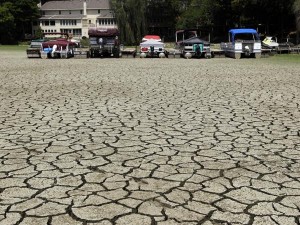MANILA, Philippines – The lack of rain and heat that summer brings not only affect people, but also farms and watersheds vital to human survival.
This is why the Philippine government is stepping up its efforts to “ensure food security for our citizens and to mitigate the possible effects” of El Niño by cloud seeding, a process that aims to induce rainfall.
“The Department of Agriculture (DA) is working closely with DOST-Pagasa to intensify cloud seeding operations to induce rain in major watersheds and drought-affected farming communities,” Communications Secretary Herminio Coloma Jr. said Monday during a televised press briefing.
Government earlier said that El Niño is expected to start in June, prompting authorities to advice people to conserve water.
Coloma said the Bureau of Soils and Water Management has already completed 15 cloud-seeding trips in municipalities in Isabela that are experiencing dry spells.
“The DA said these cloud seeding operations have prevented damage on some 4,155 hectares of corn farms across the province, of which 3,490 hectares are in reproductive stage and 665 hectares in the vegetative stage,” he said.
Authorities have also turned to shallow tube wells and drought-tolerant crop varieties to aid farming communities that are most affected by the drought.
“As part of long-term measures, the DA has increased its investments on the establishment of small water impounding facilities, repair, rehabilitation and construction of new irrigation systems as well as communal irrigation systems under national irrigation system administered by the National Irrigation Administration (NIA) to help guarantee agricultural water even during the summer season,” Coloma said.
A total of P1.3 billion has already been allocated for the construction of small-scale irrigation facilities.
RELATED STORIES
Angat level drops; cloud seeding set
NIA starts cloud seeding over Magat Dam
